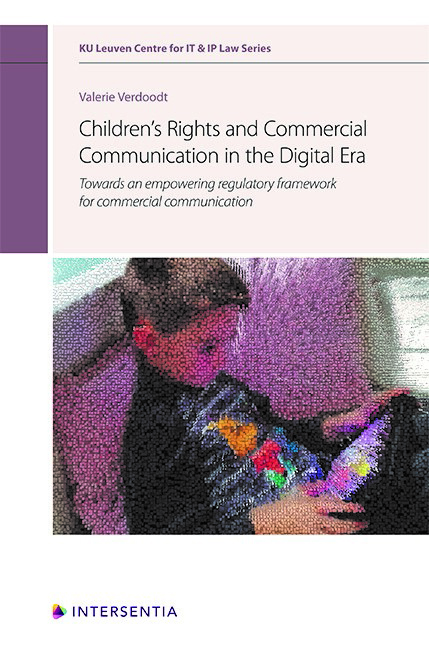 Children's Rights and Commercial Communication in the Digital Era
Children's Rights and Commercial Communication in the Digital Era On 20 November 2019 the United Nations Convention on the Rights of the Child celebrates its 30th anniversary. In 1989, when the Convention was adopted, children came across advertising on television, on billboards in the street, in shops and through leaflets in their mailbox. Over the past 30 years, the way in which children are targeted by advertisers and the formats that are used have changed significantly. Think of advergames, influencer marketing, and behavioural targeted advertising. The specific features of these formats, such as their immersive, interactive and personalised nature, make it difficult for children to understand the commercial and persuasive intent of the commercial messages directed at them.
Valerie Verdoodt's doctoral research presents an original and timely fundamental rethinking of the regulatory framework of commercial communication from a children's rights perspective. Offering a carefully considered, well-documented overview and in-depth evaluation of several legislative frameworks, policy documents, self- and co-regulatory initiatives and literature from a variety of disciplines, she has worked towards the development of children's rights-inspired recommendations for an empowering regulatory framework for online commercial communication aimed at children. It is a subject with great societal relevance which contributes to the further realisation of children's rights in the digital environment.
Dr. Verdoodt convincingly concludes that the children's rights framework requires a balance between empowering children to cope with advertising (i.e. by educating them and providing them with the necessary opportunities to practice their commercial decision-making skills) and protecting them against harmful or misleading advertising and advertising that processes their personal data in an opaque manner (i.e. by recognizing the limitations to advertising literacy and providing additional protections). She found that, at present, the regulatory framework puts too much emphasis on empowerment with much of the responsibility resting on the shoulders of children and their parents, thereby tipping the empowerment-protection scales out of balance. She helpfully suggests that combining all the elements of the regulatory toolbox is the only way to restore that balance. This toolbox includes inter alia the enhanced enforcement of the regulatory framework, stimulating the collaboration between regulatory bodies, improving the structure and enforcement of advertising Alternative Regulatory Instruments and carrying out children's rights impact assessments that respect the multi-dimensionality of rights, when developing advertising and marketing campaigns.
To save this book to your Kindle, first ensure [email protected] is added to your Approved Personal Document E-mail List under your Personal Document Settings on the Manage Your Content and Devices page of your Amazon account. Then enter the ‘name’ part of your Kindle email address below. Find out more about saving to your Kindle.
Note you can select to save to either the @free.kindle.com or @kindle.com variations. ‘@free.kindle.com’ emails are free but can only be saved to your device when it is connected to wi-fi. ‘@kindle.com’ emails can be delivered even when you are not connected to wi-fi, but note that service fees apply.
Find out more about the Kindle Personal Document Service.
To save content items to your account, please confirm that you agree to abide by our usage policies. If this is the first time you use this feature, you will be asked to authorise Cambridge Core to connect with your account. Find out more about saving content to Dropbox.
To save content items to your account, please confirm that you agree to abide by our usage policies. If this is the first time you use this feature, you will be asked to authorise Cambridge Core to connect with your account. Find out more about saving content to Google Drive.